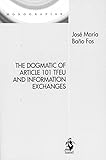The dogmatic of Article 101 TFEU and information exchanges
Por: Baño Fos, Jose Maria .
.
Tipo de material:  LibroSeries Monografías.Editor: Madrid : Iustel, 2018Descripción: 238 p. 22 cm.Tipo de contenido: Texto (visual) Tipo de medio: sin mediación ISBN: 9788498903461.Tema(s): Competencia
LibroSeries Monografías.Editor: Madrid : Iustel, 2018Descripción: 238 p. 22 cm.Tipo de contenido: Texto (visual) Tipo de medio: sin mediación ISBN: 9788498903461.Tema(s): Competencia| Tipo de ítem | Ubicación actual | Signatura | Estado | Fecha de vencimiento | Código de barras |
|---|---|---|---|---|---|
 Libro
Libro
|
Biblioteca y Centro de Documentación CNMC - Biblioteca de Competencia
Biblioteca especializada en Derecho de la Competencia, Derecho Mercantil y Economía Dirección C/ Barquillo, nº 5, 28004 Madrid
|
LIB-2502 (Navegar estantería) | Disponible | 12089 |
Information exchanges are at the heart of most European and national investigations nowadays. In fact, they cover a substantive part of the Commission’s Guidelines on Horizontal Cooperation. In bureaucratic terms, they are a “policy priority”.
However, the development of such an infringement has come at the expense of legal certainty as it implies, de facto, redrawing the red lines that safeguard Article 101 TFEU. By punishing this behavior as a “self-standing” infringement, the area of protection of Article 101 TFEU is broadened. It is no longer necessary to show the existence of a cartel, it suffices to show that the exchange (or disclosure) could most logically end up in a cartel, for the practice to be prohibited and punished.
This raises several questions that this book seeks to answer: is there an economic basis for such a conclusion? If so, does this infringement fit within the wording and purpose of Article 101 TFEU? And ultimately, as with any other infringement, how can we avoid committing type I mistakes while ensuring the effectivity of Article 101 TFEU?
Addressed towards practitioners and scholars this book provides a useful toolkit for analyzing information exchanges and their likelihood to carry out a fine while, at the same time, develops a systematic analysis on the legal nature of Article 101 TFEU.

No hay comentarios para este ejemplar.